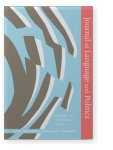Why do politicians cite others in political debates?
A functional analysis of reported speech in a Japanese political debate
Politicians often quote opponents in political debates so as to highlight contradictions between the opponents’
prior statements and their current political actions, thus construing their political character negatively. From a dialogic
perspective, reported speech, alternatively termed “extra-vocalisation”, can be defined as a tool used by speakers to deny
alternative points of view and justify their own positions, while simultaneously positioning the audience in agreement with the
speaker’s own views. Drawing on this notion of extra-vocalisation, the current study analyses a Japanese political debate to show
how politicians use different types of voice to validate their own political ideologies and devalue opposing views. In doing so,
the study also identifies the relevant linguistic resources of Japanese in order to show how dialogic positioning via
extra-vocalisation is manifested in Japanese, and highlight the fact each language provides its own resources to convey such
meanings.
Article outline
- 1.Political discourse analysis
- 2.Dialogic positioning via extra-vocalisation
- 3.Data and background of the debate
- 4.Justifying one’s own political stance via extra-vocalisation
- 4.1The citizens’ voice
- 4.2The aligned parties’ voice
- 4.3The professionals’ voice
- 5.Rejecting opposing points of view via extra-vocalisation
- 5.1The opponents’ voice
- 5.2The heavyweight speaker voice: The Prime Minister
- 5.2.1Prime Minister’s voice: Criticism via adversative structure
- 5.2.2Prime Minister’s voice: Criticism via attitudinal grammatical resources
- 5.3Citizens’ voice: Criticism of Japanese view
- 6.Discussion
- 7.Conclusion
- Acknowledgement
-
References
References
Antaki, Charles, and Ivan Leudar
2001 “
Recruiting the Record: Using Opponents’ Exact Words in Parliamentary Argumentation.”
Text 21 (4): 467–88.


Benoit, William L., Glenn J. Hansen, and Rebecca M. Verser
2003 “
A meta-analysis of the effects of viewing U.S. presidential debates.”
Communication Monographs 701: 335–350.


Benoit, William Lyon
2014 Political Election Debates: Informing Voters about Policy and Character. Lexington: Lexington Books.

Clark, Herbert H., and Richard Gerrig
1990 “
Quotations as demonstrations.”
Language 661: 764–805.


Chilton, Paul
2004 Analyzing Political Discourse: Theory and Practice. London: Routledge.


Gruber, Helmut
2015a “
Policy-Oriented Argumentation or Ironic Evaluation: A Study of Verbal Quoting and Positioning in Austrian Politicians’ Parliamentary Debate Contributions.”
Discourse Studies 17 (6): 682–702.


Fairclough, Isabela, and Norman Fairclough
2012 Political Discourse Analysis. London: Routledge.

Finlayson, Alan
2007 “
From beliefs to arguments: interpretative methodology and rhetorical political analysis.”
British Journal of Politics and International Relations 9 (4): 545–63.


Feldman, Ofer, Ken Kinoshita, and Peter Bull
2015 “
Culture or communicative conflict? The analysis of equivocation in broadcast Japanese political interviews.”
Journal of Language and Social Psychology 341: 65–89.


Hyland, Ken
1999 “
Academic attribution: Citation and the construction of disciplinary knowledge.”
Applied Linguistics 20 (3): 341–367.


Inako, Ayumi
2015 “
Affiliating in crisis: a linguistic perspective on community formation on Twitter after the nuclear accident in Japan in 2011
.” PhD diss., The University of Technology, Sydney.
Isshiki, Maiko
2011 “
nihongo no hojodooshi ‘-te shimau’ no bunpooka: shukanka, kanshukanka o chuushin ni [Japanese grammaticalisation of an auxiliary verb,
te shimaui: Focusing on subjectivity and intersubjectivity].”
Nihonkenkyuu 151: 201–221.

Kuo, Sai-Hua
2001 “
Reported Speech in Chinese Political Discourse.”
Discourse Studies 3 (2): 181–202.


Leech, Geoffrey Neil, and Mick Short
1981 Style in Fiction: A Linguistic Introduction to English Fictional Prose. London: Routledge.

Martin, Samuel Elmo
1975 A Reference Grammar of Japanese. Tokyo: Tuttle Language Library.

Maynard, Senko K.
1994 “
Images of involvement and integrity: Rhetorical style of a Japanese politician.”
Discourse and Society 5(2): 233–261.


Maynard, Senko K.
1997 Danwa bunseki no kanoosee – riron, hoohoo, nihongo no hyoogensee [
Discourse analysis: theory, method and Japanese expressivity]. Tokyo: Kuroshio Publisher.

Maynard, Senko K.
1999 ‘‘
Grammar, with attitude: On the expressivity of certain da sentences in Japanese.’’
Linguistics 37 (2): 215–250.


Shibata, Masaki
2018 “
Why is Toru Hashimoto called “a Japanese version of Trump” or “Hitler”?: Linguistic examination of the Hashimoto’s attack on his opponents.”
Japanese Journal of Political Science 19 (1): 23–40.


Shibamoto-Smith, Janet S.
(
2011) “
Honorifics, ‘politeness’ and power in Japanese political debate.”
Journal of Pragmatics 431: 3707–3791.


Sunagawa, Yuriko
1988 “
Inyoobun ni okeru ba no nijuusee nit suite [the duality of place in citation].”
Nihongogaku 7 (9): 14–29.

Suto, Kinuko and Christopher Barnard
2013 “
Nominalisation and nouniness as meaning strategies in Japanese political manifestos.” In
Systemic Functional Perspectives of Japanese: Descriptions and Applications, edited. by
Elizabeth A. Thomson, and
William S. Armour, 173–209. Sheffield: Equinox Publishing.

Tannen, Deborah
2007 Talking Voices: Repetition, Dialogue, and Imagery in Conversational Discourse. Cambridge: Cambridge University Press.


Thompson, Geoff
1996 “
Voices in the Text: discourse perspectives on language Reports”.
Applied Linguistics 171: 501–30.


Van Dijk, Teun A.
1998 “
What is political discourse analysis?” In
Political linguistics, edited by
Blommaert, Jan and
Chris Bulcaen, 11–52. Amsterdam: John Benjamins.

White, Peter Robert
1998 “
Telling Media Tales
.” PhD diss., The University of Sydney.
Wodak, Ruth
2009a The discourse of politics in Action. London: Palgrave Macmillan.

Wodak, Ruth
2009b “
Language and politics” In
English language: Description, variation and context, edited by
Culpeper, Jonathan,
Paul Kerswill,
Ruth Wodak,
Anthony McEnery, and
Francis Katamba, 576–593. London: Palgrave.


Yonezawa, Yoko
2016 “
Nexus of Language and Culture: A Study of Second Person Reference Terms in Japanese with Special Focus on Anata ‘You’
.” PhD diss., Australian National University.
Cited by
Cited by 2 other publications
Rubio-Carbonero, Gema & Núria Franco-Guillén
Shibata, Masaki
2021.
Reported Speech as Persuasion: A Discourse Analysis of Japanese Journalism.
Japanese Studies 41:2
► pp. 221 ff.

This list is based on CrossRef data as of 19 april 2022. Please note that it may not be complete. Sources presented here have been supplied by the respective publishers.
Any errors therein should be reported to them.
